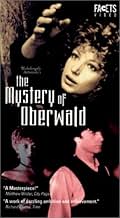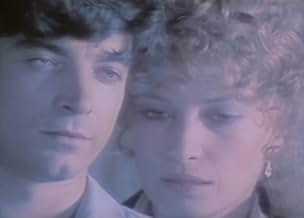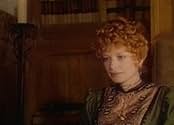VALUTAZIONE IMDb
6,2/10
1009
LA TUA VALUTAZIONE
Aggiungi una trama nella tua linguaOne long decade after the assassination of her husband, a reclusive queen comes face-to-face with the deceased's doppelgänger and anarchist poet, and strikes a three-day pact; however, fate ... Leggi tuttoOne long decade after the assassination of her husband, a reclusive queen comes face-to-face with the deceased's doppelgänger and anarchist poet, and strikes a three-day pact; however, fate has other plans. What is the mystery of Oberwald?One long decade after the assassination of her husband, a reclusive queen comes face-to-face with the deceased's doppelgänger and anarchist poet, and strikes a three-day pact; however, fate has other plans. What is the mystery of Oberwald?
- Premi
- 2 vittorie totali
Trama
Lo sapevi?
- QuizOne of the first major international feature films to be shot on video, a controversial decision at the time of its release.
- ConnessioniFeatured in Michelangelo Antonioni: Lo sguardo che ha cambiato il cinema (2001)
Recensione in evidenza
The Mystery of Oberwald is a made of television movie, done in video before being transferred to 35mm. As introduced by Lorenzo Codelli, this movie reunites actress Monica Vitti and director Michelangelo Antonioni since their last collaboration in Red Desert, some 17 years earlier. During this while, Vitti became a fairly successful comedic actress, while Antonioni was like a globetrotter having films made in the UK (Blowup), US (Zabriskie Point) and having a documentary done in China about China on the invitation of the Chinese government of the time. The movie was shot for state broadcast television, which was appealing to filmmakers at that time because it was increasingly difficult to raise funds for theatrical feature films.
And if Antonioni wanted to make a film to dabble with video technology, then perhaps he had achieved that goal. Technically it had employed many tricks of the trade through its cinematography and editing, but what strikes you most is the use of colours in the movie to accentuate mood of its characters, through various changes and transitions, with contrasting hues and tints used which dissolves every now and then. When used at the great outdoors, the generous shots of nature were given a life of its own, and in those terms, makes it a very beautiful film to gawk at.
If only the story could match up to its technical strengths. Based on the play "L'Aigle a Deux Tetes" by Jean Cocteau, it's no wonder that the movie played out exactly like a stage play. To make things worse, the dialogue was excruciatingly painful to sit through, perhaps being a period piece, we have to make do with characters speaking in more elaborate terms and beating around the bush. It could be another case of having its nuances lost in translation, but if that's the case, then the subtitles really did the story no favour. The situations the story unfolded were rather unconvincing, and quite dry. Unfortunately too that Monica Vitti wasn't able to arrest you with the special x-factor that she possessed in the earlier Antonioni movies, and looked rather tired in her role as The Queen, who has rather queer habits.
The story picked up early when a pursued Sebastian (Franco Branciaroli) ended up breaking into the castle at Oberwald to perform an assassination of the Queen, only to have fainted before carrying out his mission. The only saving grace for him, is his resemblance to the late King, and herein lies his ticket to get out with the Queen still nursing a longing, and takes a natural liking for Sebastian. In between an unlikely, unrealistic and unconvincing romance is thick politicking between the Queen and her enemies, chiefly the Archduchess whom we never see on screen. There's much talk about fate and destiny and the likes, but that's only when you can tolerate and get through Act One which happens to be mostly a monologue where the Queen rants to an unconscious Sebastian.
Certainly The Mystery of Oberwald in my opinion is not one of Antonioni's best, nor does it come close to being something quite memorable. This movie currently ranks as my least favourite of all the Antonioni movies watched to date, and elevates my other Antonioni disappointments as masterpieces to be celebrated.
And if Antonioni wanted to make a film to dabble with video technology, then perhaps he had achieved that goal. Technically it had employed many tricks of the trade through its cinematography and editing, but what strikes you most is the use of colours in the movie to accentuate mood of its characters, through various changes and transitions, with contrasting hues and tints used which dissolves every now and then. When used at the great outdoors, the generous shots of nature were given a life of its own, and in those terms, makes it a very beautiful film to gawk at.
If only the story could match up to its technical strengths. Based on the play "L'Aigle a Deux Tetes" by Jean Cocteau, it's no wonder that the movie played out exactly like a stage play. To make things worse, the dialogue was excruciatingly painful to sit through, perhaps being a period piece, we have to make do with characters speaking in more elaborate terms and beating around the bush. It could be another case of having its nuances lost in translation, but if that's the case, then the subtitles really did the story no favour. The situations the story unfolded were rather unconvincing, and quite dry. Unfortunately too that Monica Vitti wasn't able to arrest you with the special x-factor that she possessed in the earlier Antonioni movies, and looked rather tired in her role as The Queen, who has rather queer habits.
The story picked up early when a pursued Sebastian (Franco Branciaroli) ended up breaking into the castle at Oberwald to perform an assassination of the Queen, only to have fainted before carrying out his mission. The only saving grace for him, is his resemblance to the late King, and herein lies his ticket to get out with the Queen still nursing a longing, and takes a natural liking for Sebastian. In between an unlikely, unrealistic and unconvincing romance is thick politicking between the Queen and her enemies, chiefly the Archduchess whom we never see on screen. There's much talk about fate and destiny and the likes, but that's only when you can tolerate and get through Act One which happens to be mostly a monologue where the Queen rants to an unconscious Sebastian.
Certainly The Mystery of Oberwald in my opinion is not one of Antonioni's best, nor does it come close to being something quite memorable. This movie currently ranks as my least favourite of all the Antonioni movies watched to date, and elevates my other Antonioni disappointments as masterpieces to be celebrated.
- DICK STEEL
- 2 lug 2008
- Permalink
I più visti
Accedi per valutare e creare un elenco di titoli salvati per ottenere consigli personalizzati
- How long is The Mystery of Oberwald?Powered by Alexa
Dettagli
Contribuisci a questa pagina
Suggerisci una modifica o aggiungi i contenuti mancanti

Divario superiore
By what name was Il mistero di Oberwald (1980) officially released in Canada in English?
Rispondi























